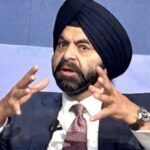
The Lagos State Governor, Mr Babajide Sanwo-Olu, on Wednesday, presented a budget estimate of N2.2tn for the 2024 fiscal year to the state House of Assembly.
The budget, tagged “Budget of Renewal,” comprises N1.02trn recurrent expenditure, which is 45 per cent of the total budget, and N1.22tn capital expenditure, which is 55 per cent of the budget.
Presenting the budget to the lawmakers, Sanwo-Olu said, “The Year 2024 Budget, as proposed, has a total budget size of N2.24tn, comprising a total revenue of N1.84tn and deficit financing of N398.283bn.
“The total revenue comprises our Internally Generated Revenue and total federal transfers as follows: Total IGR, N1.251trn; and total federal transfer, N596.6bn.
“We equally propose a recurrent expenditure of N1.021tn, comprising total overhead, total personnel cost and recurrent debt service broken down as follows:
“Total Overhead Cost: N527.782bn; this is made up of overhead, N304.753bn; subventions, N123.010bn; dedicated funds amounting to N100.02bn; total personnel cost, N319.230bn; and recurrent debt service of N174.94bn.”
The governor added that “For Capital Expenditure, we propose a total figure of N1.224tn,” which comprises Capital Expenditure of N856.387bn and repayments, N367.893bn.”
Breaking down the proposed budget by sectors, Sanwo-Olu said Economic Affairs got the largest chunk of the 2024 budget with an estimate of N535bn.
Environment got N94bn; Health, N156bn; N199bn for Education; N50bn for Social Protection; while Public Order and Safety got N84bn.
The governor noted that the 2024 appropriation proposal would further cushion the effects of the fuel subsidy removal and other economic hardships on the people of Lagos.
Speaking on the performance of the 2023 budget, Sanwo-Olu said his government had implemented 78 per cent of the budget as of the end of the third quarter, and projected that at least 90 per cent implementation would have been achieved by the end of the year.
In his remarks, the Speaker of the House, Mudashiru Obasa, called for the employment of more people into the state’s workforce for the effective implementation of government policies.





